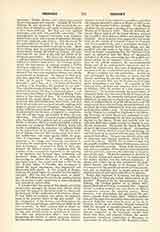

GREGORY VIII, Antipope, Was Mauritius Burdinus (Bordinho, Bourdin), who was placed upon the papal chair by Emperor Henry V, March 8, 1118. Bourdin was a Frenchman, born probably at Limoges. He received a good education at Cluny, and followed his fellow-Benedictine, Bernard, Archbishop of Toledo and Primate of Spain, beyond the Pyrenees. At a time when Cluny stood for learning and reform, his advancement was assured. In 1098, he was made Bishop of Coimbra (Gams); in 1111, he was raised to the Metropolitan See of Braga. Three years later, in consequence of a quarrel with the primate, he was suspended by Paschal II. Coming later to Rome, he so ingratiated himself with the pontiff, who was also a Cluniac, that he was retained at court and employed on weighty affairs. In 1117, when Henry came to Rome to force his terms upon thepope, Paschal, safe in Benevento, sent Bourdin with some cardinals to negotiate with the emperor. This mission proved to be the downfall of Bourdin. Seduced from his Gregorian principles, he openly espoused the cause of Henry, and, to emphasize his apostasy, placed the crown upon the emperor on Easter Day. He was promptly excommunicated; but was marked our for the supreme dignity by his new associates. A few months later, when Henry, learning of Paschals death, hastened to Rome, surrounded by jurists, only to find that he had been outwitted by the vigilance of the cardinals, failing to capture Gelasius, he declared the latters election null, and, after a discourse by the learned Irnerius of Bologna on imperial rights, induced a bribed assembly of Romans to proclaim Bourdin pope, who with unconscious irony took the name of Gregory. The honors of the papacy turned to ashes in his hands. Repeatedly excommunicated and finally delivered as a prisoner into the hands of Callistus II, he was detained in several monasteries until his death about 1137. Thus ended the career of a prelate “whom”, says William of Malmesbury (Gesta Regum Angl., V, 434), “everyone would have been obliged to venerate and all but adore on account of his prodigious industry, had he not preferred to seek glory by so notorious a crime”. One of the canons of the Ninth General Council, 1123, declares all ordinations made by him after his condemnation, or by any bishop by him consecrated, to be irritcr.
JAMES F. LOUGHLIN

